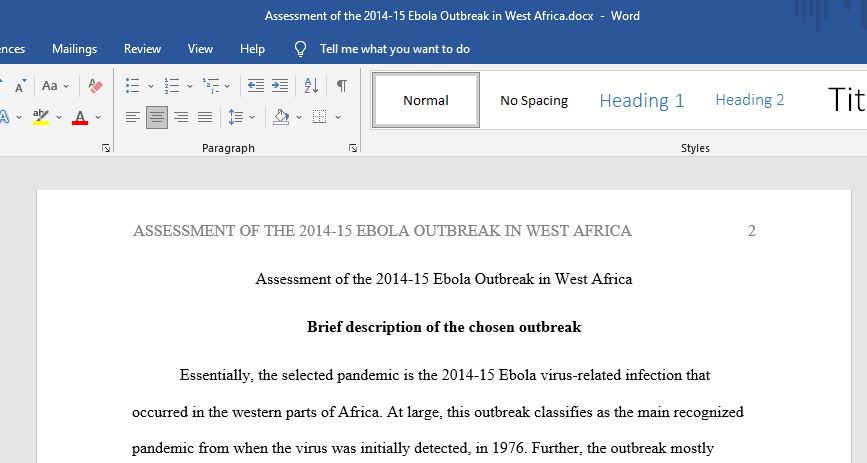Assessment of the 2014-15 Ebola Outbreak in West Africa
HS315-5: Evaluate a public health response to a disease within a population.
Professional Competency Outcome
PC-4.1: Assess the value of multiculturalism and diversity in a global environment.
Instructions
There are many diseases affecting populations around the globe that include a cultural component as to how they are perceived, treated or cured, and who should be involved when addressing illness. For instance, during the large-scale Ebola outbreak in West Africa in 2015, there were several cultural practices that perpetuated the transmission of disease and hindered containment efforts.
Health and medical professionals must respond to these ‘public health emergencies’ quickly, but must take into consideration how the affected population will react to the response, including cultural beliefs that may contribute to the continued spread of these infections.
After reviewing the Unit 8 Readings, choose either the 2014-15 Ebola outbreak in West Africa or a specific population affected by the HIV/AIDS pandemic as the topic for your paper, and write a minimum 500 word expository essay that addresses the following:
- Provide a brief description of the chosen outbreak.
- What organizations were/are responsible for responding to the chosen public health emergency?
- How did these organizations address cultural practices that may have contributed to the spread of disease?
- Was importance placed on how the disease was perceived, treated, and who needed to be involved (traditional healers, religious healers, etc.) in the response?
- In your opinion, how successful were the organizations in trying to change cultural beliefs to prevent the spread of disease? Explain.
Additional Readings:
HIV:
Mofolo, Tholoana. (2010). The role of culture in contributing to the spread of HIV/AIDS. AISA POLICYbrief, 29: 1-12.
Sovran, Steven. (2013). Understanding culture and HIV/AIDS in sub-Saharan Africa. Journal of Social Aspects of HIV/AIDS, 10 (1): 32-41.
Wyatt, G. E., Williams, J.K., Gupta, A., and Malebranche, D. (2013). Are cultural values and beliefs included in the U.S. based HIV interventions? Prev Med., 55(5): 362-370.
Ebola:
Manguvo, A., & Mafuvadze, B. (2015). The impact of traditional and religious practices on the spread of Ebola in West Africa: time for a strategic shift. The Pan African Medical Journal, 22(Suppl 1), 9. http://doi.org/10.11694/pamj.supp.2015.22.1.6190
Southall, H. G., DeYoung, S. E., & Harris, C. A. (2017). Lack of Cultural Competency in International Aid Responses: The Ebola Outbreak in Liberia. Frontiers In Public Health, doi:10.3389/fpubh.2017.00005
World Health Organization. (2015). Factors that contributed to undetected spread of the Ebola virus and impeded rapid containment. Retrieved from http://www.who.int/csr/disease/ebola/one-year-report/factors/en/
Requirements
- The paper should be at least 500 words in length.
- There should be a minimum of three credible references used, including the source for your chosen organization, which should be presented in APA format.
- Go to Academic Tools for assistance with writing and APA.
Requirements: 500 words
Answer preview:

word limit:590
